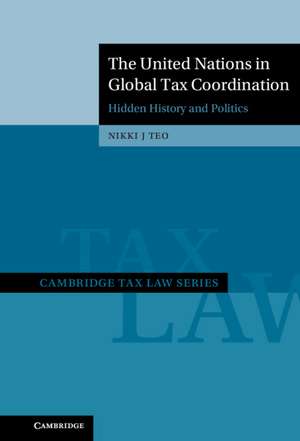The United Nations in Global Tax Coordination: Hidden History and Politics: Cambridge Tax Law Series
Autor Nikki J. Teoen Limba Engleză Hardback – 22 mar 2023
Din seria Cambridge Tax Law Series
- 23%
 Preț: 2575.05 lei
Preț: 2575.05 lei - 23%
 Preț: 939.20 lei
Preț: 939.20 lei -
 Preț: 353.83 lei
Preț: 353.83 lei -
 Preț: 185.12 lei
Preț: 185.12 lei -
 Preț: 433.63 lei
Preț: 433.63 lei -
 Preț: 302.87 lei
Preț: 302.87 lei - 14%
 Preț: 777.86 lei
Preț: 777.86 lei - 23%
 Preț: 870.25 lei
Preț: 870.25 lei -
 Preț: 421.48 lei
Preț: 421.48 lei - 11%
 Preț: 520.25 lei
Preț: 520.25 lei - 14%
 Preț: 945.06 lei
Preț: 945.06 lei - 23%
 Preț: 1974.50 lei
Preț: 1974.50 lei - 11%
 Preț: 481.99 lei
Preț: 481.99 lei - 14%
 Preț: 897.68 lei
Preț: 897.68 lei -
 Preț: 283.63 lei
Preț: 283.63 lei - 14%
 Preț: 724.92 lei
Preț: 724.92 lei -
 Preț: 292.07 lei
Preț: 292.07 lei -
 Preț: 208.86 lei
Preț: 208.86 lei - 14%
 Preț: 784.98 lei
Preț: 784.98 lei - 23%
 Preț: 955.88 lei
Preț: 955.88 lei - 20%
 Preț: 1397.91 lei
Preț: 1397.91 lei - 23%
 Preț: 669.05 lei
Preț: 669.05 lei - 18%
 Preț: 667.50 lei
Preț: 667.50 lei
Preț: 789.80 lei
Preț vechi: 918.37 lei
-14% Nou
Puncte Express: 1185
Preț estimativ în valută:
151.12€ • 158.21$ • 125.05£
151.12€ • 158.21$ • 125.05£
Carte tipărită la comandă
Livrare economică 05-19 aprilie
Preluare comenzi: 021 569.72.76
Specificații
ISBN-13: 9781009180467
ISBN-10: 1009180460
Pagini: 380
Dimensiuni: 152 x 229 x 27 mm
Greutate: 0.83 kg
Editura: Cambridge University Press
Colecția Cambridge University Press
Seria Cambridge Tax Law Series
Locul publicării:New York, United States
ISBN-10: 1009180460
Pagini: 380
Dimensiuni: 152 x 229 x 27 mm
Greutate: 0.83 kg
Editura: Cambridge University Press
Colecția Cambridge University Press
Seria Cambridge Tax Law Series
Locul publicării:New York, United States
Cuprins
1. Introduction; 2. Prelude to global tax coordination: the league's Princeton mission in the Americas; 3. Creation of the fiscal commission (1943– 1946); 4. Pax Americana, cold war and decolonisation: impact on the UN institutional machinery for fiscal activities and postwar international financial flows; 5. First session of the fiscal commission and aftermath (1947); 6. Related intervening developments (September 1947– November 1948); 7. Second session of the fiscal commission and aftermath (1949); 8. Related intervening developments (January 1949– April 1951); 9. Third session of the fiscal commission and aftermath (1951); 10. Related intervening developments (May 1951– April 1953); 11. The taxation of international air transport and contending with ICAO (1947– 1951); 12. Fourth session of the fiscal commission and aftermath (1953); 13. Dissolution of the fiscal commission and subsequent developments; 14. Conclusion.
Notă biografică
Descriere
This book reveals the missing international tax history of how the UN was ousted from global international tax policy making by developed countries.
